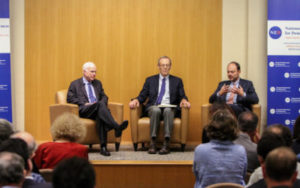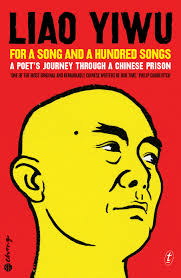Two prominent advocates of freedom and human rights were honored on Thursday at the 8th annual Oxi Day Courage Awards, held at the U.S. Institute of Peace in Washington DC, notes the Greek Reporter:
The award is given by the Washington Oxi Day Foundation, an organization that commemorates and promotes the courageous Greek “Oxi” (“No”) to fascist forces during World War II, while working to improve Greece’s international perception today.

Vladimir Kara Murza (far right) with NED’s Carl Gershman (center) and Senator John McCain.
In this year’s ceremony, the foundation honored Vladimir Kara-Murza, Vice President of Open Russia and leading activist for a civil society and democracy in his country, who has been poisoned twice by his enemies and survived….The second award recipient was Liu Xia, widow of China’s most prominent human rights advocate, Nobel Laureate, Liu Xiabo. Liu Xia was freed in July 2018 after serving eight years in house arrest without any charges levied against her. She has also faced death threats.
“We are grateful to the Oxi Day Foundation for creating an award that links brave freedom fighters in the world today to the example set by the Greeks in 1941 when they answered the Nazi demand for surrender with a defiant and courageous ‘no’,” said Carl Gershman, president of the National Endowment for Democracy. “By creating the Oxi Courage Award they have found a way to give voice to the voiceless and hope for people fighting for freedom in some of the darkest corners of the world.”
 I had the rare privilege of meeting Liu Xia last month in New York when we were both there to take part in the presentation to the Chinese writer Liao Yiwu of an award named for the great Czech president and playwright Vaclav Havel, Gershman adds:
I had the rare privilege of meeting Liu Xia last month in New York when we were both there to take part in the presentation to the Chinese writer Liao Yiwu of an award named for the great Czech president and playwright Vaclav Havel, Gershman adds:
Liu Xia was indirectly connected to Havel through her husband Liu Xiaobo who, like Havel, was a public intellectual and political dissident of global stature. When Liu Xiaobo was arrested in 2009 for being the lead author and organizer of Charter 08, a manifesto for democracy and constitutional government in China that was inspired by Havel’s Charter 77 in Czechoslovakia, it was Havel who led the campaign to award him the Nobel Peace Prize, which Liu received in 2010.
Liu Xiaobo was in prison when the Nobel ceremony was held in Oslo, and in place of his Nobel Address, the Swedish actress Liv Ullmann read Liu’s closing statement at his trial in which he decried “the enemy mentality of the regime” that poisoned the spirit of China and declared that “there is no force that can put an end to the human quest for freedom.”
The most moving part of Liu’s statement was his impassioned expression of love for his wife Liu Xia, whose own love, he said, “is the sunlight that leaps over high walls and penetrates the iron bars of my prison window, … allowing me to always keep peace, openness, and brightness in my heart, and filling every minute of my time in prison with meaning. … Even if I were crushed into powder,” Liu said, “I would still use my ashes to embrace you.”
In the video of Liu Xia accepting the Oxi Courage Award (above) last month in New York, she graces us all by reading her hauntingly beautiful poem “Silent Strength,” which powerfully affirms that, in fact, “there is no force that can put an end to the human quest for freedom.” RTWT







